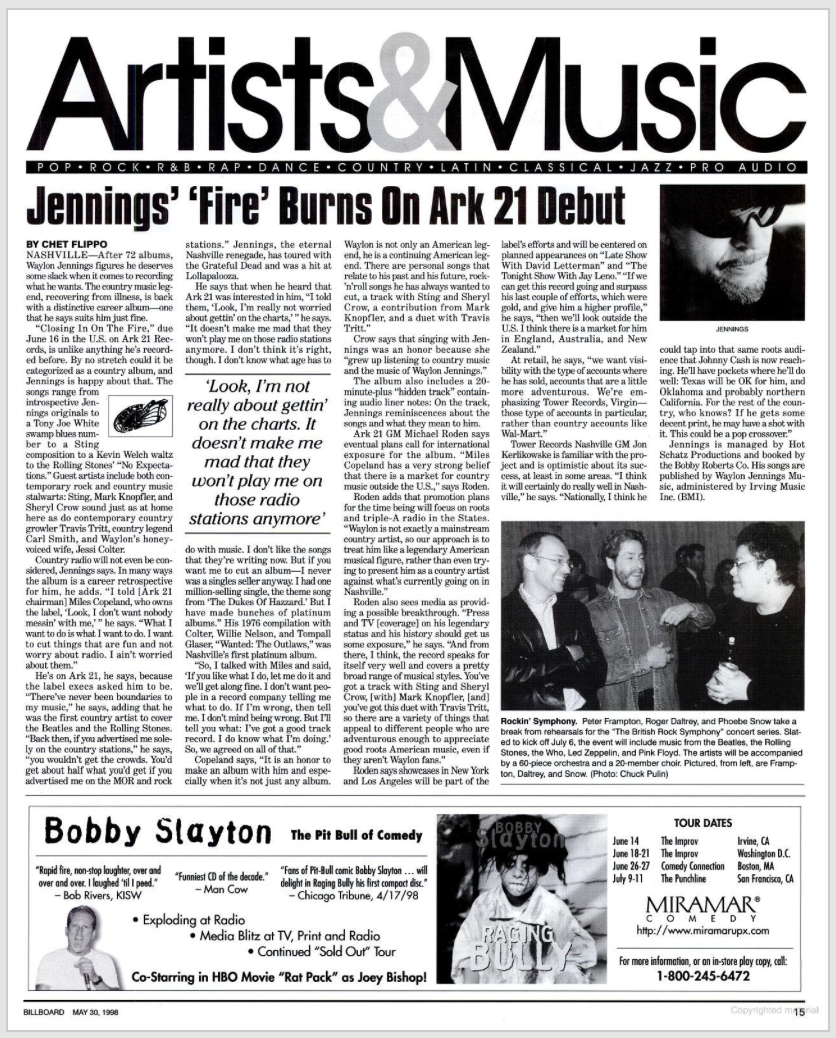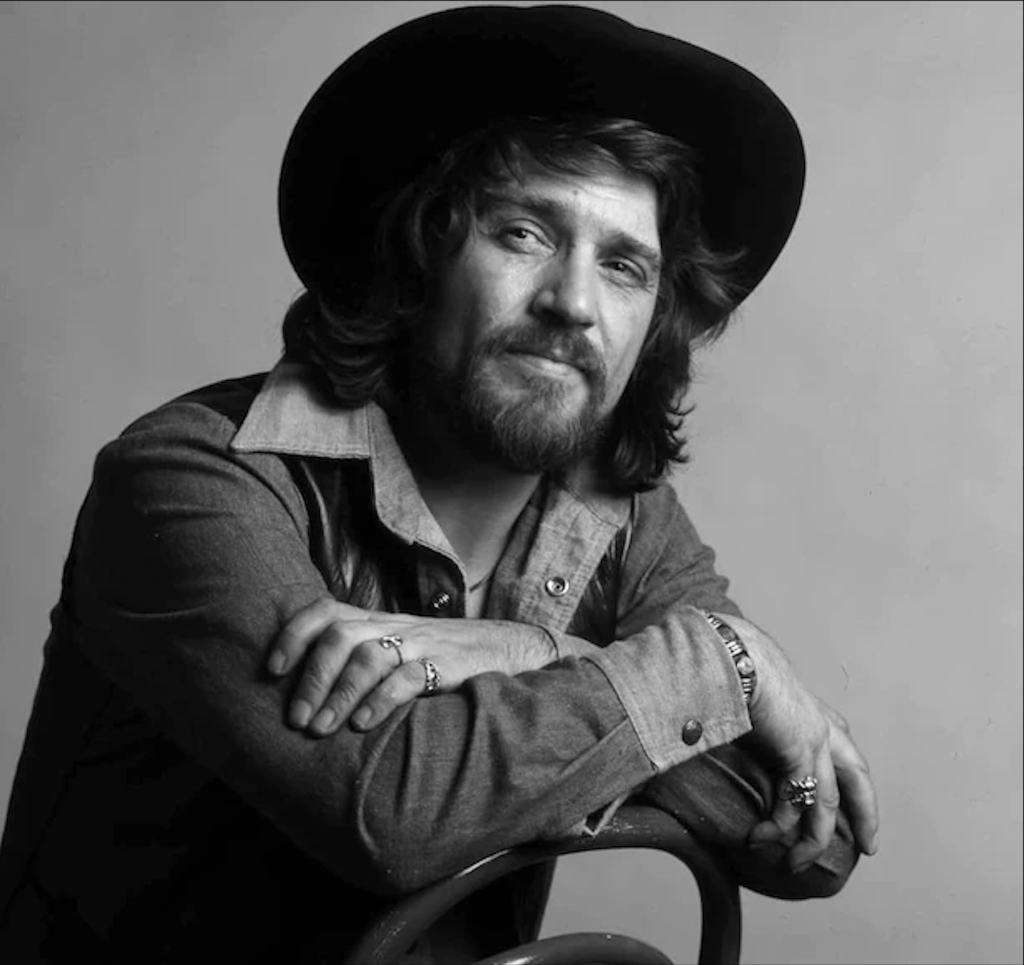
A brief history of Waylon Jennings life is important to put him in context in the history of Texas music. Jennings was born in 1937 in Littlefield, TX and famously started his music career as the bass player in Buddy Holly’s band. After swapping his place on Holly’s plane for a friend’s seat on the tour bus, Jennings became the only surviving member of Holly’s band after the plane crashed in 1959.
Interesting connection to class: Buddy Holly produced Waylon Jennings’ first record, which was “Jole Blon”, in 1958.
Following a lull in his music career following Holly’s death, Jennings signed with RCA records in 1965 and moved to Nashville shortly thereafter, where he became roommates with country music star Johnny Cash (prior to either becoming famous!). During his time in Nashville, Jennings garnered a reputation as an “outlaw” and “rebel” for fighting back against the studio system and playing and recording what he wanted. Also during his time in Nashville, Jennings became good friends with Willie Nelson, whom he recorded lots of music with throughout the years.
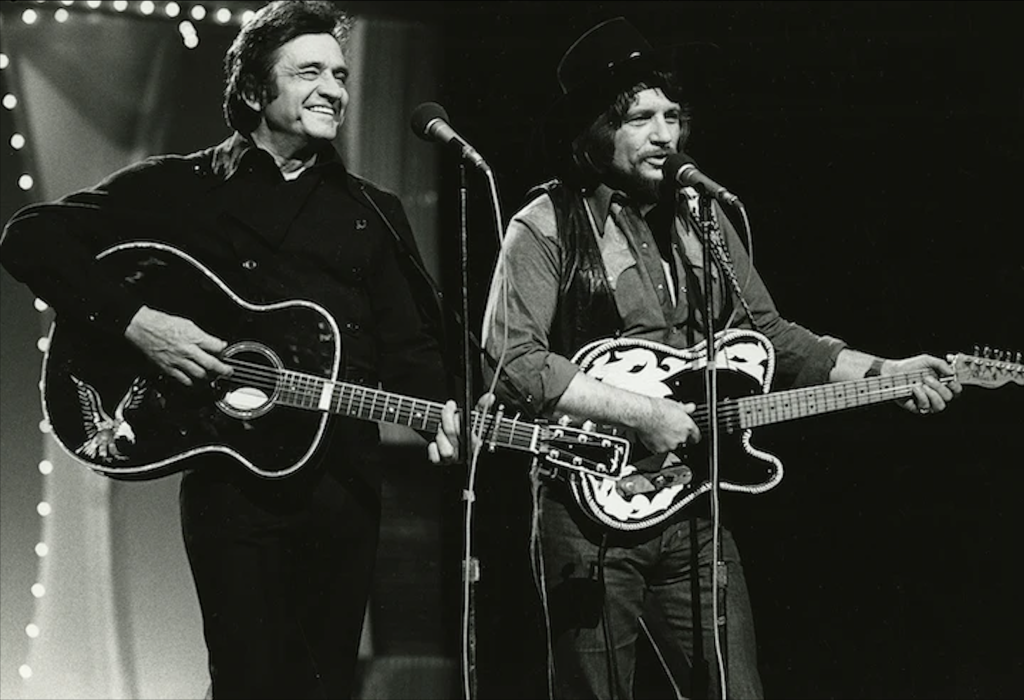
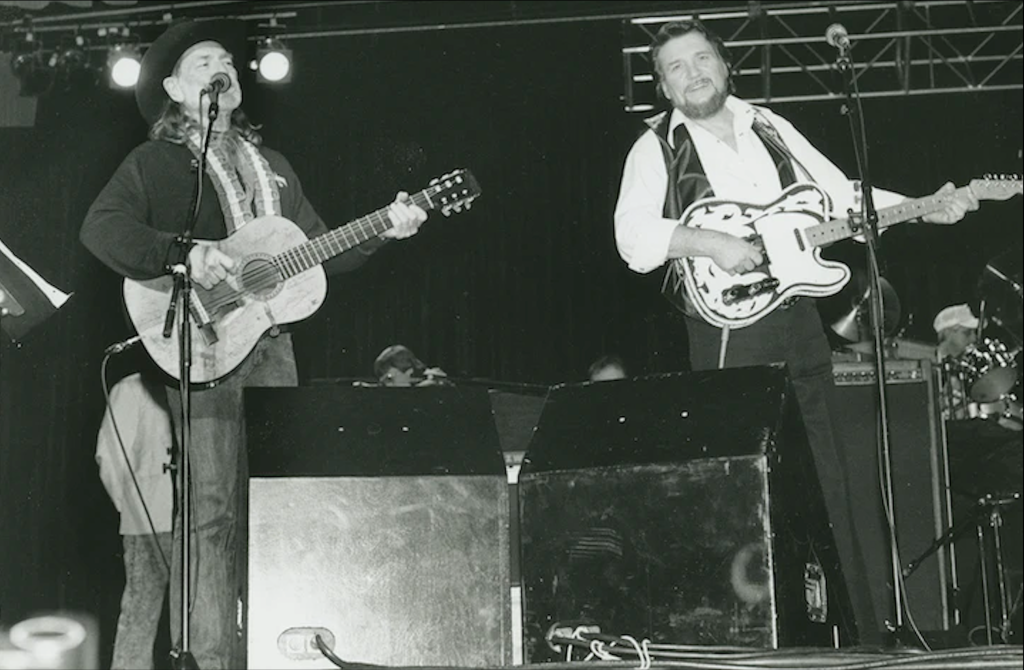
After suffering through and ultimately beating a cocaine addiction in the 80’s, Jennings help form the country supergroup “The Highwaymen” which made music from 1985-1995. The Highwaymen included Johnny Cash, Waylon Jennings, Kris Kristofferson, and Willie Nelson.
Definition: Supergroup - A musical group whose members are successful as solo artists or as members of other successful groups.
Jennings eventually stopped touring in 1997, with a career filled with 45 studio albums, 5 live albums, and 16 collaboration albums. He was inducted into the Country Music Hall of Fame in 2001, and unfortunately died shortly after in 2002 due to complications with diabetes.
Artifact #1: Billboard Magazine (May 30th, 1998)
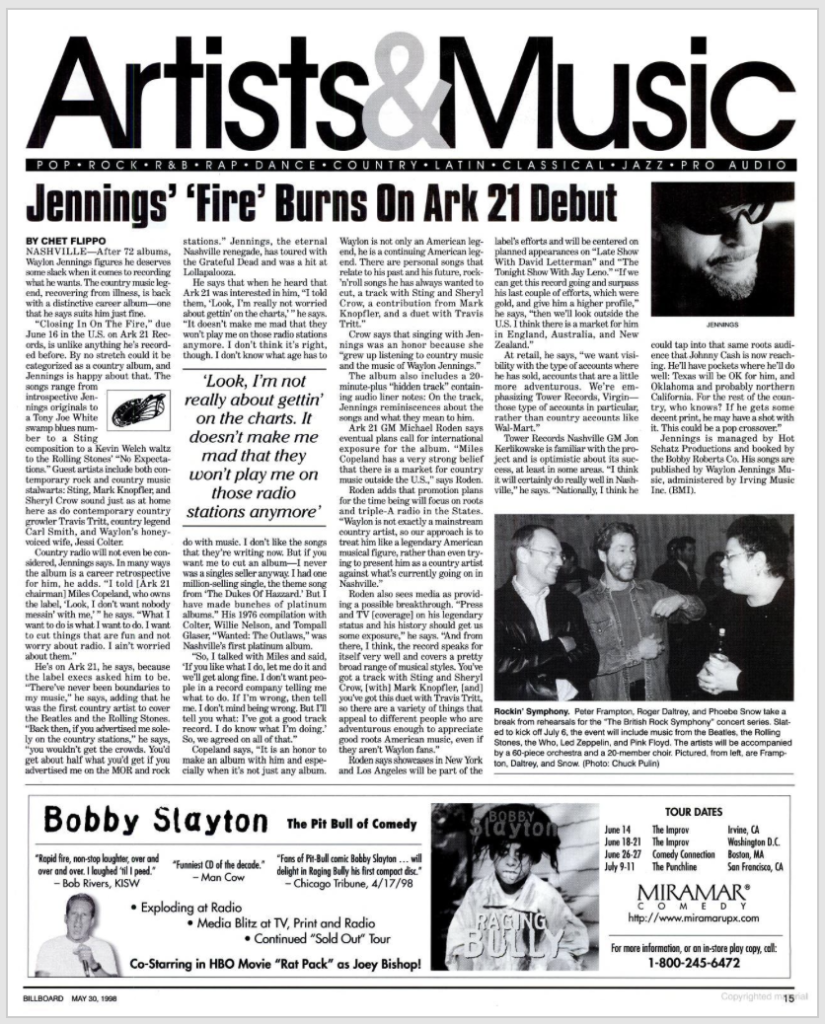
This artifact is an article from Billboard Magazine published in 1998 about Jennings’ newest album, Closing in on the Fire (1998). This article contains some direct quotes from Jennings that perfectly illustrate his “outlaw” mindset towards the studio system. The first quote of note is:
“I told [Ark 21 Chairman] Miles Copeland, who owns the label, ‘Look, I don’t want nobody messin’ with me'”… “What I want to do is what I want to do. I want to cut things that are fun and not worry about radio. I ain’t worried about them.”
Waylon Jennings, 1998
The second quote of note is:
“Look, I’m not really about gettin’ on the charts. It doesn’t make me mad that they won’t play me on those radio stations anymore.”
Waylon Jennings, 1998
From the mouth of the horse, Jennings is not a man to be told what to do, and he is going to do what he wants. Jennings was a constant thorn in the side of his record label, RCA, due to the fact the Jennings would play what he wanted, not what he was told. Jennings did not care for popularity or profit, but rather was more focused on the process and enjoyment of making music.
Artifact #2: The University Daily (Volume 50 Number 50)
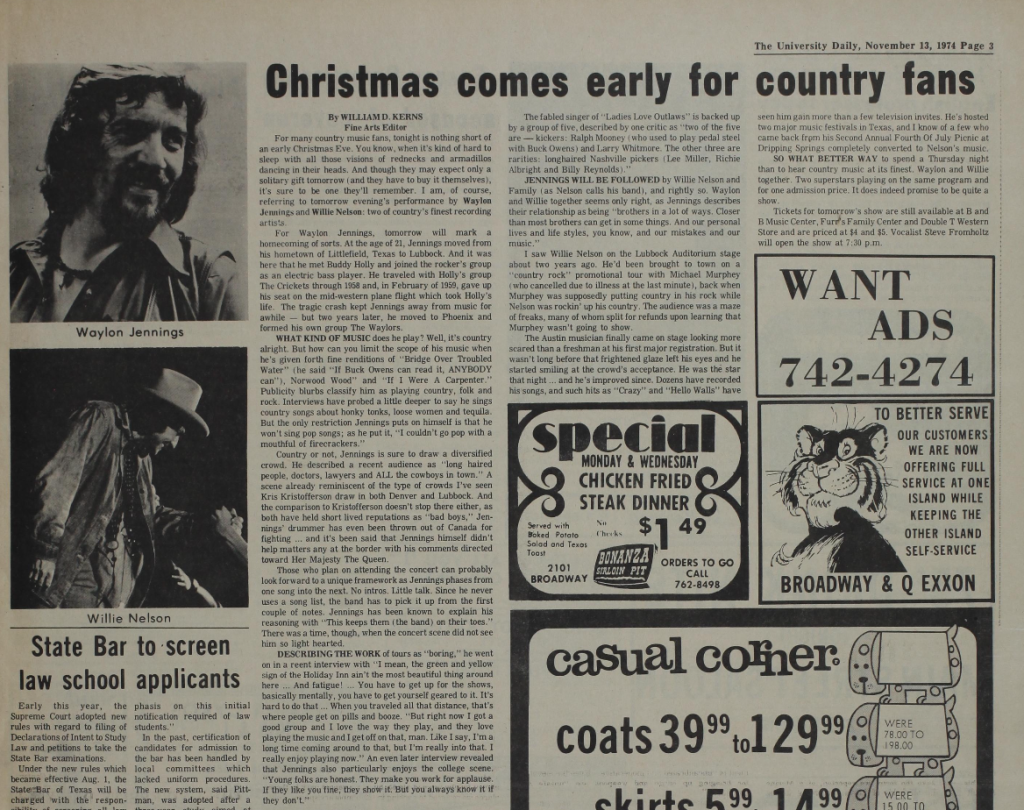
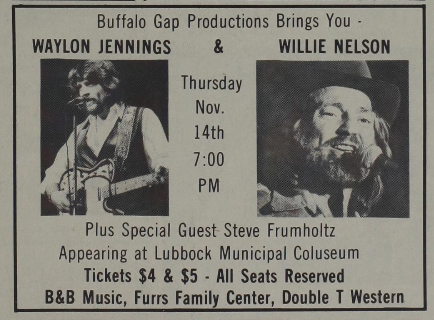
This artifact is a student newspaper article from Texas Tech University in Lubbock, TX published November 13th, 1974 and written by William D. Kerns. The article of interest is a story about a local concert that Jennings is putting on for charity in his hometown (according to the article, Jennings moved from Littlefield to Lubbock where he met Buddy Holly and joined his band). The article acts as an important artifact as it illustrates the relationship and musical partnership that existed between Waylon Jennings and his good friend Willie Nelson. Jennings and Nelson were very good friends and made lots of music together. According to this article, Jennings invited his friend to his hometown to join him for this concert.
This article also holds some interesting quotes from Jennings that describe the range of fans in his audiences:
“He [Waylon Jennings] described a recent audience as ‘long haired people, doctors, lawyers and ALL the cowboys in town.'”
William D. Kerns quoting Waylon Jennings, 1974
Also directly from Jennings in this article is the following quote:
“But right now I got a good group and I love the way they play, and they love playing the music and I get off on that, man. Like I say, I’m a long time coming around to that, but I’m really into that. I really enjoy playing now.”
Waylon Jennings, 1974
This seems to encompass Jennings’ love for music and playing with his friends and family. Jennings did not have much care for the commercial aspects of his music, and instead was focused on the enjoyment of the music he was making and performing.
Songs
While not necessary for this assignment, I’ve included some of my favorite Waylon Jennings songs below:
References
“Waylon Jennings”. Country Music Hall of Fame. https://www.countrymusichalloffame.org/hall-of-fame/waylon-jennings Flippo, Chet. “Jennings’ ‘Fire’ Burns On Ark 21 Debut” Billboard Magazine. Google Books, 30 May 1998. pp. 15. https://books.google.com/books?id=fQ4EAAAAMBAJ&pg=PA15&dq=Waylon+Jennings&hl=en&sa=X&ved=2ahUKEwiJy_T67vr9AhWDq4kEHRA_CQkQ6AF6BAgCEAI#v=onepage&q=Waylon%20Jennings&f=false Kerns, William D. “Christmas comes early for country fans”. The University Daily. 13 Nov. 1974. pp. 3. http://collections2.swco.ttu.edu/handle/20.500.12255/125739

